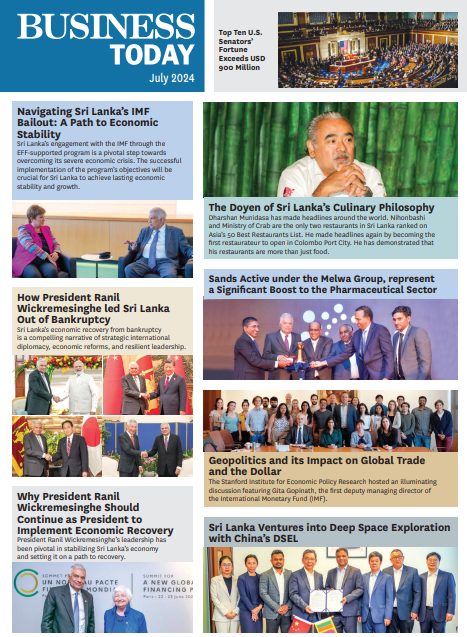Michael Rake is the Chairman of KPMG International and Senior Partner of KPMG in the UK. Prior to his appointment as Chairman of KPMG International he was Chairman of KPMG in Europe. On a global level post Enron, Rake has led the campaign to ensure that there was a progressive and pragmatic legislative response. Rake has been the driving force behind KPMG UK’s award winning Corporate Social Responsibility Programmes in which KPMG has been not only the leading professional services firm but also one of the leading firms in the UK, Europe and the United States. He also established the ground breaking KPMG Foundation which is dedicated to tackling education disadvantage among young people. On a recent visit to Sri Lanka, which took in KPMG’s tsunami reconstruction projects, Rake took time off to speak with Business Today on the role of corporate governance and in particular the impact of the Sarbanes Oxley act upon the local and global accounting profession.
By Dinesh Weerakody Assisted by Harin Fernando.

What is your role in KPMG?
I am chairman of the board at KPMG international and, therefore the senior partner at KPMG. My role is to develop with the board, and strategies of the firm and to ensure that strategy is executed. My role is also to engage around the world with clients, our people, and with regulators, politicians and the media. Part is ambassadorial, part is internal, part is strategic, and the other aspect has to deal with problems and issues as and when they arise.
The Sarbanes-Oxley imposes huge cost burdens and time constraints on companies. Should there be some compromise?
I think the difficulty here is that we have to understand whether or not it was a large or small number of companies, clearly, there was abuse, and scandals; there were business failures, failures by non execs, failures by advisors, investment banks, lawyer, regulators, and accounting firm who have or who are perceived to have failed in their responsibilities.
When that happens inevitably, you have a regulatory and political response; quite frankly, I think the Sarbanes Oxley was done in haste. I think there have been some benefits, but it has been very expensive in terms of time and cost and I think the real challenge is to try and get the cost ratio benefit right for domestic and foreign registrants. Any company that happened to be listed as a foreign registrant also got hit by the requirement to comply with Sarbanes Oxley. It was delayed a year to give more time and now as you know the rules are somewhat relaxed in terms of allowing judgment to be used in applying Sarbanes Oxley which was not the case in the first round. So inevitably there is an element of overreaction, but you have to expect that given the scandals that occurred.
“At the end of the day I think it is very important that you have transparency and disclosure in financial statements. We have to do something about the simplicity and clarity.”
In terms of IAS 32 and IAS 39 what are the implications and challenges for developing countries?
I think what is very important is the adoption of international accounting standards by the European Union this means international accounting standards are being used everywhere in the world more or less, except in the United States. The real objective here is to have a convergence between US and international accounting standards so we can have one set of global accounting standards hopefully based on principles rather than rules. This would reduce the cost of reporting and improve transparency and comparability, so that is the real prize here. Accounting standards, particularly relating to derivatives, are extremely complicated, indeed you may have seen the FASB (Financial Accounting Standards Board) are going to try and come up with impler rules to deal with derivatives. If you take IAS 32 and 39 as you know there has been a lot of disagreement, the EU refused to accept elements of it because of what it meant. It is extraordinarily complex and has major im Lication on the balance sheet, profit and loss account. I think there has to be a very careful review to make sure we get financial instrument derivatives clearly understood. To be honest I think that some countries in Europe failed to understand clearly the implications of the international accounting standards before they were obligatory. What everyone realises now is that there has to be a really good dialogue between the standard setters and particularly the developing world to understand the particular issues that arise. Many people say the US rules are very precise, detailed and complex and do not always take account of local conditions. This can be very difficult, particularly in the financial services industry.
Then what about the implications from IFRS 7?
At the end of the day I think it is important that you have transparency and disclosure in financial statements. Because accounting at the end of the day involves judgment. At any point in time you could go back three years and those might be different. In a financial institution you make huge judgements, around provisions for loan losses etc. and those circumstances change over a period of time so you make the best judgement you can at that time. You have to combine therefore complying with the standards with disclosures so people can understand the financial statements. The problem at the moment in my view is that the disclosures themselves tend to be complex. So people do not necessarily understand them, but we have to face up to the need for proper disclosure. I think the real trick, is to get more clarity and simplicity into accounting standards and disclosures. Based on principles of judgement that people can really understand, because I think there are very few people now who understand them at all and clearly many analysts do not understand them!
Globally how do you ensure that your audit practices and procedures are implemented to maintain quality?
Well that is a major challenge, we have a 100,000 people around the world and we have three major objectives; we want to be a multi-disciplinary firm, we want to be an employer of choice (to get the best people and retain them) and we are absolutely committed to global consistency. So we put a huge amount of effort, not only into the processes, technology and the training but also into the values. We have a standard set of values and behaviour we call the ‘KPMG way’ that is applied everywhere in the world. Two and a half years ago we completely redesigned our audit process and launched it globally, we have global training on that, the same training across the globe. We have quality control reviews by people in the region and we work extremely hard trying to make sure that everywhere in the world, an audit is an audit, and it is the way we want it done, consistently.
“At the end of the day I think it is very important that you have transparency and disclosure in financial statements. We have to do something about the simplicity and clarity.”
The audit career may not be attracting the best calibre of individual. As a compan y what are you doing to become an employer of choice?
KPMG is famous for its people, we believe that the recruitment and retention of people is key. What we want is people to work in an environment with interesting and challenging work, where the work-lifestyle balance is right and where they are proud to work for us, a firm that is committed to its communities. These are very important things.
In a firm like ours we believe that aa,ing audit, tax and advisory servces means that our people get a range of experience and to be a good auditor they need to have a broad scope of experience.
Prior to the scandals and Sarbanes Oxley etc, the audit had been driven in some countries to a commodity. What people realise now is that an audit is important to the efficient operation of the capital markets and is extremely valuable.
Often partners in Audit Firms are accused of glossing over issues because of conflict of interest. Do you have a code of best practice?
The fact is, whether we like it or not, the rules of independence have got dramatically stricter and so has the perception of those issues. What we have done is to introduce a code of conduct, guidelines and a set of rules to be enforced. We now have a global computer system called Sentinel, and every piece of work done anywhere in the world, has to be checked into the Sentinel system to ensure we do not have a conflict and we have something like 13,000 enquiries a week on this system. So it is a massive task, in terms of trying to do our very best to m?ke sure no conflict does arise, and there are no breaches with the independence rules. The problem is we are dealing with multiple different agencies, so in one country you might have to deal with the US rules, UK rules, EU rules and Canadian rules and they could all be different. So the complexity of dealing with this is a big challenge, in terms of what is the rule for the company itself? What is the rule for the country? Where the company is listed? It is a big task and we have put a lot of effort and technology into it.
As a firm what initiatives have you taken to look after the interests of the minority shareholders?
There are various different levels here. We have public interest companies and public companies that have audit committees and we are very clear. Our responsibility is to work with management because you can’t do an audit without doing that, but you work for the audit committee. The audit committee of the board is responsible for making sure that all the shareholders are treated fairly. Our job is to make sure the audit committee has all the facts as to the basis of the financial statements.
What should Sri Lankan companies do to improve levels of governance and transparency?
The UK is certainly not perfect! As you may recall 15 years ago we
I am not an expert on Sri Lanka First of all we need to understand that capitalism in my view and globalisation only work in the long term if the many benefit from it, not just the few. So there has to be a real understanding that business has a very big responsibility to its communities from a reputational point of view and from a business point of view. You have to accept that the more open you are, the more transparent you are, the clearer you are, the better. So if you move to real transparency, not clouding things with complexities, what should happen is a level playing field with the companies who are the most open, most responsible and acting with most integrity ultimately succeeding on a long-term basis.
There has to be a rea I understanding that business has a very big responsibility to its communities. So the better the environment you are in, the better it is, the more business you do.”
Can you comment on the overall quality of published financial statements in the UK?
The UK is certainly not perfect! As you may recall 15 years ago we had the Maxwell scandal and he did it twice! In the 80’s, following the Maxwell scandal, there were some significant reforms in the UK about governance, audit committees, disclosure of remuneration for both executives and auditors and non-audit fees to auditors. As a result I think a much-enhanced level of transparency was established. The latest review done in terms of corporate governance in the UK shows that the reforms that were carried out 15 years ago have worked well.
What are the elements of a good corporate citizenship in the accounting industry? In the accounting industry we have a responsibility for the operations of the capital markets. As auditors we have a special responsibility, we have to be proud of what we do and be strong and tough regarding our audits. This is our primary responsibility. In the community, all professional service firms including accountants have to face up to the issue of corporate social responsibility. It is the old story of ‘buy a man a fish and he will eat today, teach him how to fish he will never go hungry.’ So involving people in communities, volunteering programmes, working with people to help them start companies, in terms of putting something back into the community through their skills as professionals, is where I think the accounting firms have a lot to offer.
It is really a good thing, because it is good for recruitment, good for development, our people are proud to do it, they learn from doing it and at the same time they benefit their communities.
Should auditors also be rotated, say every five years, to give a fresh perspective?
All the evidence indicates that if you rotate audit firms you reduce quality, you reduce knowledge about the business and it increases cost and reduces efficiency. The Bocconi University in Milan, Italy, the only country where they have had rotated the auditors for some time, showed that audit quality suffered and there were no benefits to cost or competition. Having said that, what you need to do is have a fresh look, changing the partner in the UK and US every five years and every seven years in the EU, gives a fresh look and perspective. The result is that you gain a fresh look without losing the institutional knowledge.
You spoke of becoming an employer of choice. How do you to propose to maintain this mantle?
We have a younger and different generation coming through, so their aspirations are different. In firms like ours, you will always have quite a high turnover, because of the training and development and when you see what happens in the emerging economies, then the demand for these skills is just enormous We cannot compete only on money, but what we can do is create an interesting work environment, where employees like the work, get on with their colleagues, they are mentored and they develop and they see a future for themselves if they want to stay, they see a firm that they are proud to work with. Accountants work very long hours and we are trying to do a lot to manage the work and lifestyle balance. We are also doing a lot around diversity, particularly in the west where for the last 25 years or more 50% of our graduate recruitment has been female, but only 8% of our partners are female. These are just some of the ways we can improve our retention and be an employer of choice. (And KPMG has just won Best Large Employer of The Year in the UK)
You spoke about India and China. What are the challenges you see for your audit practice?
It comes down to resources. India is producing two million graduates a year, they are English-speaking and our challenge there is to persuade the Indian institutes not to be so restrictive on the number of people that are allowed to be trained by an individual firm, which is not very helpful. But there are a lot of English speaking graduates and the challenge there is to recruit, train and keep them. In China as you know, the universities were shut down for ten years during the cultural revolution, so there is a huge experience shortage. At the same time you have to have Mandarin-speaking capability in China to deal with the massive expansion of state enterprise, private enterprise and public companies many with global ambitions. This year we will recruit 800 graduates in China, but we cannot absorb all of them in the short term so some will be put in London and New York, etc., and there is a challenge in coping with this. For us there is a lot of work that we cannot take, we will only take the work if we can do it properly.
As a member of the big four what are your DOs and DON’Ts when it comes to securing an audit?
First of all we go through a client acceptance procedure, we do research and background into the executives of the company and what we are fundamentally looking for is integrity and financial capability. For example when we take on an audit we assume that everyone is competent. If this is not the case, then we are faced with doing extra work and we also assume that they are honest and if that is not the case then we have to resign. Once you come to the point where you are not sure of the company’s honesty then there is no way to continue.
With the ever-increasing liability imposed on auditors, what are you doing to protect your professional staff?
Three things. Firstly education on the expectation gap. Understanding people still do not know what an audit is! And is not! Secondly in many countries we are incorporated as limited liability partnerships, which protect the assets of the individual and thirdly we are arguing for liability reform in all the major economies. In Australia and Germany we have limited liability, in the UK proportionate liability is being introduced. So we have been trying hard to make the case for liability reform, because we are the only people operating in the capital markets who are expected to work with unlimited liability and for four firms to back 95% of capital markets is not possible. After all it is not the auditors that make companies go bust!
“We have to work on our consistency, reporting, training and the development of people and we have to try and ensure we do a better job explaining what we do.”
Is KPMG looking to diversify?
To the contrary, when I took over I was determined that we should not be all things to all people. I think that one of the mistakes of the accounting firms is that they tried to be too big and do too many things, management consulting, systems integration and technology and all of these lead us to lose our focus. We do audits, tax and we do risk and financial advisory services We have the skills and market permission to do that, and we need those skills to do audits, this is where I want to focus. We grew last year by 16.7%. We are growing stronger in advisory as more and more companies are facing problems with regulation. So we have more than enough work developing our business in the emerging markets, in addition to dealing with the concerns of audit committees in developed nations.
Is CSR all about the bottom line? Tell us about some of your CSR initiatives.
Clearly four big accounting firms are not enough. We need to see globally over a period of time the second tier federations getting stronger. For them to do that we need liability reform, we need consistent accounting standards globally, so it is easier to train and apply. If we can do that, we can develop a very strong accounting profession. In the meantime we must avoid the consequences of collapse due to litigation. We have to work on our consistency, reporting, training and the development of people and we have to try and ensure we do a better job explaining what we do.
What is your impression of our accountancy profession?
CSR is about bottom line. It is one of our key values to be involved with our communities. In the UK 35% ofour people are involved in volunteering in their communities. We have worked more than half a million hours supporting communities globally. After the tsunami we had a global appeal and we raised 3.5 million dollars. We allocated a portion of the money to our office in Sri Lanka; I am going to visit projects that we are involved in. We have encouraged and supported projects like this and We will have built 180 houses by the end of this month.
What are you doing to address the IT skill gap of accountants in your practice?
We try to enhance the training of our auditors and basic understanding of IT and we now have IRM (information risk management) specialists, who come in on sophisticated environments. We still do not have enough of these people and are investing heavily in them.
Do you consciously work on the client auditor relationship?
Ironically we have been accused of being too close to the client, given some of the recent scandals, but in my opinion you cannot do a proper audit if you do not work with the client. If you want to find out what is going on, you have to build trust, find out what is going on and build relationships, a working, constructive relationship. There has to be independence and objectivity. It requires management to respect the right of the auditor to say things the management may not want to hear, but it requires the auditor to properly listen to management. So the relationship is very important but it must remain one of constructive independence and integrity one where you can honestly disagree, and this will lead to a proper audit with benefits for all.
What are the challenges for the big accounting firms in the next few years?
Sri Lanka has a very high literacy rate and a good education system, you have historically strong professionalism. What I have noticed from my first visit in 15 years, is that our firm and the profession here has modernised enormously. What I have seen here is a major catch up in the use of technology. Sri Lanka is a country with a lot of skills and what you need is political stability and then it will become a paradise not only for tourists, but also for business and the economy over a longer period of time.








